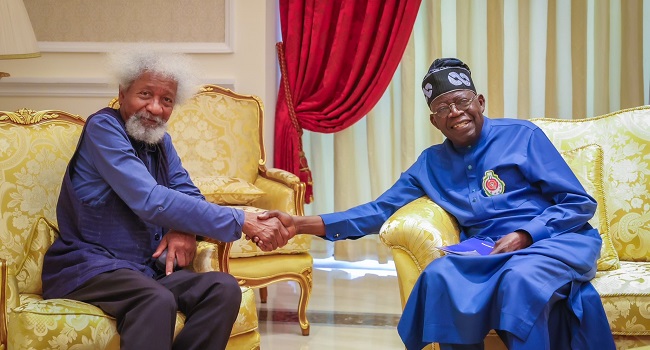Why I won’t assess Tinubu now — Soyinka
Prof. Wole Soyinka, Nobel Laureate, has revealed the reason he would not assess the administration of President Bola Tinubu at the moment. Speaking to journalists after his visit to Tinubu’s Lagos residence pn Sunday, Soyinka revealed that he also presented a seven-point agenda toward moving Nigeria forward. He added that part of the visit was […]

Prof. Wole Soyinka, Nobel Laureate, has revealed the reason he would not assess the administration of President Bola Tinubu at the moment.
Speaking to journalists after his visit to Tinubu’s Lagos residence pn Sunday, Soyinka revealed that he also presented a seven-point agenda toward moving Nigeria forward.
He added that part of the visit was to see how the president was faring after neglecting his advice to not run for president before the 2023 presidential election.
Soyinka had advised Atiku Abubakar of the PDP and Tinubu to allow youths to run for the seat.
- Ogun Gov’ship: ‘My victory at Supreme Court is near,’ Adebutu vows
- PHOTOS: Kwankwaso holds special prayer in Kano ahead of S’Court judgment
He said, “My first visit was an embarrassing visit because it was to try and persuade him not to run for office. I think I had written about that. I told Atiku and himself to leave the ground for young people. That was the last time we met five years ago. I call him secretly ‘olori kunkun’ which means the stubborn one. He ignored my advice completely.
“I came to see him to find out how he is doing after neglecting my advice. I wanted to see how he and his wife are faring. I also came to wish them a merry Christmas.
“You know we are old friends. And it was as a friend that I told him ‘don’t run,” he said.
“Something you may have noticed about me is that most heads of state when they come into office, I always leave them alone for about the first year. I know when they come in, they don’t start on ground zero, then often start even lower than that and they have to make up.
“So, I have this personal policy; whether it’s Obasanjo, Buhari, or Jonathan, you would notice that during the first year I hardly say anything.
“So, I am adopting the same principle this year. At the end one year, come and ask me the same question again.”
